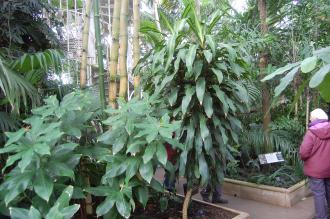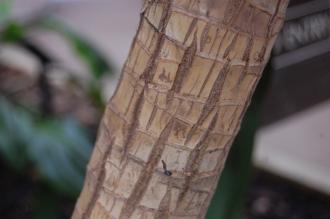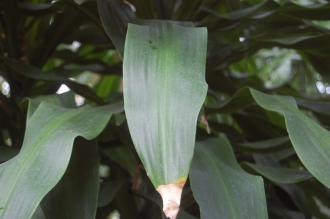
Dracaena arborea (28/02/2016, Kew Gardens, London)
Position: Full sun to partial shade
Flowering period: Al year round
Soil: Moist, well drained
Eventual Height: 10m
Eventual Spread: 2m
Hardiness: 11, 12, 13
Family: Asparagaceae
Subfamily: Nolinoideae
Dracaena arborea is a slow growing tropical evergreen tree with an upright habit. When young it usually has a single stem, as it matures it may branch. Its dark green leaves are lanceolate with entire margins, appear as a rosette, are up to 120cm long and 10cm across. With age its old leaves fall of revealing its stem. Its stem may achieve a diameter of up to 30cm. Its light brown bark is vertically fissured with radial leaf scars. Its small white bell shaped flowers appear on stems which emerge from its leaves. Its red/ orange fruit are in the form of berries.

Dracaena arborea Stem (28/02/2016, Kew Gardens, London)
Dracaena arborea, commonly known as Tree Dracaena or African Dragon Tree, is native to tropical West Africa. In its native habitat it grows as a tropical woodland understory plant.
The etymological root of the binomial name Dracaena is derived from the Greek drakaina meaning ‘she dragon’. Arborea is from the Latin meaning ‘tree’.
The landscape architect may find Dracaena arborea useful as a large single stemmed foliage plant suitable for atrium type planting schemes.
Ecologically, Dracaena arborea flowers are attractive to pollinating insects.

Dracaena arborea Leaf (28/02/2016, Kew Gardens, London)
Dracaena arborea prefers moist, humus rich, well-drained soils. It tolerates most pH of soil.
When maintaining Dracaena arborea as a houseplant its soil should be watered regularly and sparingly, the soil should never be wet. Watering should be reduced during the winter months. Its preferred active growing temperature rages from between 18ºc to 28ºc. Feeding with weak fertiliser solution should be carried out once a month during the growing season.

Landscape Architecture

